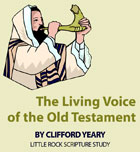Official Website of the
Catholic Diocese of Little Rock
Bible reveals troubled history of Israel
Published: October 10, 2009
This is the third column in a six-part series
By Clifford M. Yeary
Associate Director, Little Rock Scripture Study
Many of us have some idea who Moses was and what happened during the Exodus. Cecil B. DeMille’s influence is alive even after several generations. Joshua and the battle of Jericho, with its walls falling down, and the account of David with his slingshot felling the giant Goliath are, perhaps, still part of the religious memory of anyone remotely familiar with Judeo-Christian religious heritage.
 But what of the judges, people like Deborah and Gideon (he didn’t sneak Bibles into motel rooms, but the Gideon Society does use his name), who came between Joshua and David? Many of us who did grow up with stories of Israel’s judges remember some of them as stories well suited for children in search of powerful heroes. Before Superman ever appeared on the scene, the story of Samson ripping a lion to shreds with his bare hands seemed like pretty powerful stuff.
But what of the judges, people like Deborah and Gideon (he didn’t sneak Bibles into motel rooms, but the Gideon Society does use his name), who came between Joshua and David? Many of us who did grow up with stories of Israel’s judges remember some of them as stories well suited for children in search of powerful heroes. Before Superman ever appeared on the scene, the story of Samson ripping a lion to shreds with his bare hands seemed like pretty powerful stuff.
Warning: Judges is not really a book for children. Don’t expect courtroom judges or unblemished heroes. Israel's judges are military leaders, sometimes utterly unscrupulous, who bring down judgment on Israel’s foes.
A concubine gets raped and hacked to pieces. A father (Jephthah) sacrifices his virgin daughter because he made a rash oath to God. A half-brother (Abimelech) from a very large family, snubbed for being the child of a concubine, slays 70 of his siblings and is declared a king after the slaughter.
From the books of Joshua and Judges through the books of Samuel, Kings and Chronicles and later in First and Second Maccabees, the history of Israel is set before the reader as a tragically sordid affair of lost faith and betrayal by both leaders and people of their covenant with God. There are occasional bouts of heroic faithfulness as well, but the many sins, the butchery, the adultery and the apostasy, are never far behind.
What are we to make of this? Catholic scholars teach us that the history of Israel, as painfully and tragically laid out in the Old Testament, has been theologically shaped by the impact of the Exile. Even going back to Israel’s very beginnings, the biblical accounts of Israel’s history are often focused on the much later Exile.
Long after Israel had been divided into two kingdoms and the northern kingdom of Israel had been destroyed by the Assyrians (721 B.C.), the smaller and poorer kingdom of Judah was attacked by the Babylonians in 587 B.C. Its Temple was destroyed and all its skilled citizens were driven off as slaves to Babylon. They would remain there for 50 years before any returned. This was the Exile. It must have seemed to most that all God’s promises to Israel had been laid waste.
The land promised them had been violently wrested from them. The Temple which boasted God’s presence was rubble. And what of God’s promise to David that, “Your house and your kingdom shall endure forever before me; your throne shall stand firm forever?” (2 Samuel 7: 16). There were, however, faithful, educated Jews who were deeply convinced that what had befallen their people was a result of Israel’s apostasy. God’s people had rejected the One who had delivered them from slavery in Egypt, proclaimed his life-giving law to them on Sinai and gifted them with the land of the Canaanites.
These religious teachers were certain that God had warned Israel that if they rejected their covenant by engaging in the contemptible and corrupt practices of the neighboring peoples that the land would “vomit” out the Israelites in the same fashion it had the Canaanites (Leviticus 18:24-28).
The books of the Bible that record Israel’s troubled history with God do not shy away from laying the blame for the Exile on Israel’s leaders, and they are faulted almost from the very beginning. The Exile, however, proves in the end to be a catalyst to increasing faithfulness on the part of the Jewish people. The small remnant that returns from Babylon recommits itself to the everlasting covenant with God under the leadership of Ezra the scribe. Even the many Jews who remain dispersed from their homeland reclaim their identity as God’s people as the central focus of their lives.
But what of that divine promise to David concerning his throne? From the Exile on, that promise would grow in importance and expectation, until, for many, it would be understood as the promise that a descendant of David would come to them as a great deliverer, a “messiah” (anointed one). It is this expectation that is at the heart of Peter’s confession of faith in Jesus, “You are the Messiah, the Son of the living God” (Matthew 16:16).
Study Questions
1. Why does the author of the article warn that the Book of Judges is not children’s literature?
2. What profound hope did the experience of exile actually help create in God’s people?
3. Who are some of the people today who are suffering exile? What can bring them hope?
4. What message(s) of hope have helped you endure times of loss or sadness?
This article was originally published in Arkansas Catholic Oct. 10, 2009. Copyright Diocese of Little Rock. All rights reserved. This article may be copied or redistributed with acknowledgement and permission of the publisher.









